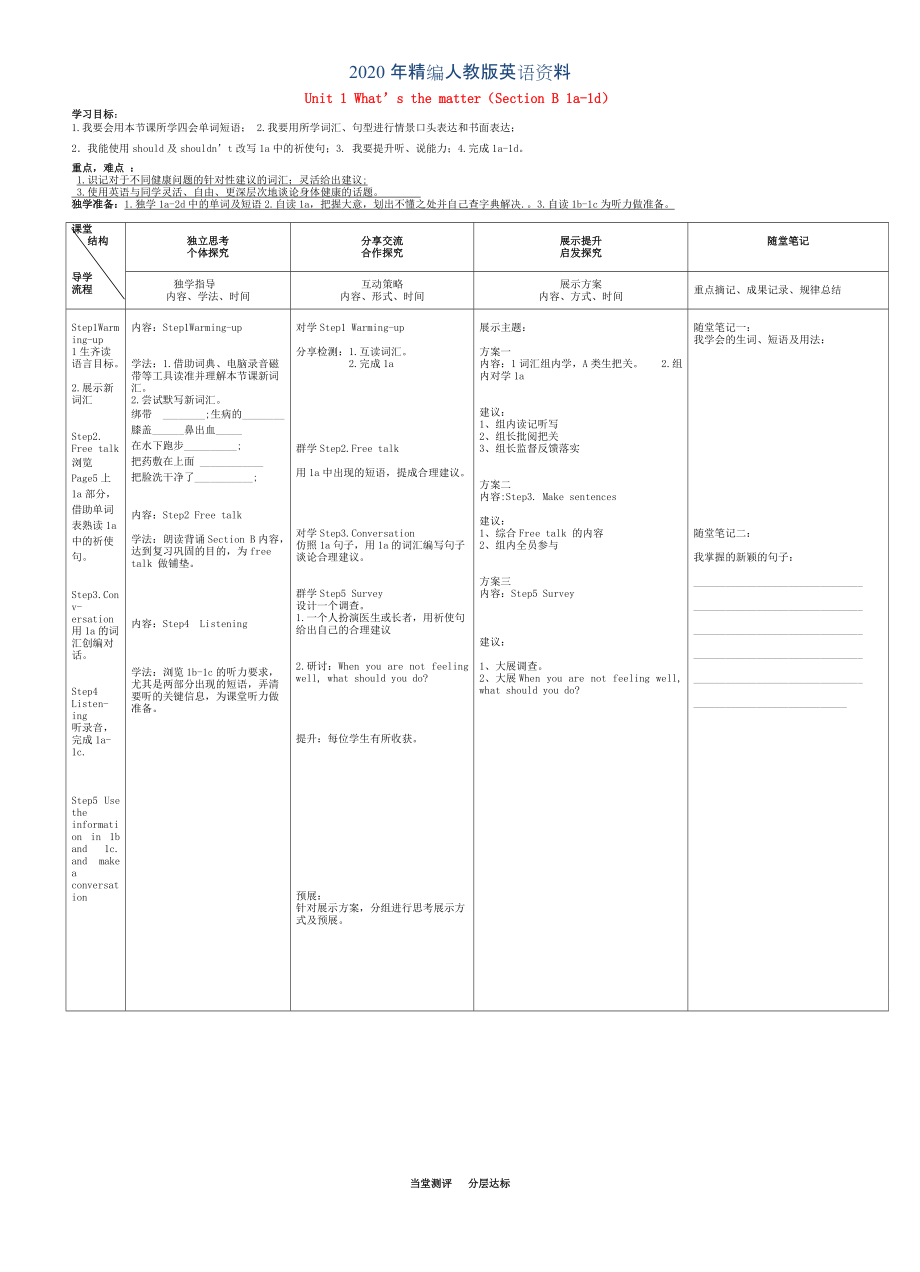《年人教版八年級(jí)英語(yǔ)下冊(cè) Unit 1 What’s the matterSection B 1a1d導(dǎo)學(xué)案》由會(huì)員分享��,可在線閱讀�,更多相關(guān)《年人教版八年級(jí)英語(yǔ)下冊(cè) Unit 1 What’s the matterSection B 1a1d導(dǎo)學(xué)案(2頁(yè)珍藏版)》請(qǐng)?jiān)谘b配圖網(wǎng)上搜索。
1����、2020年精編人教版英語(yǔ)資料
Unit 1 What’s the matter(Section B 1a-1d)
學(xué)習(xí)目標(biāo):
1.我要會(huì)用本節(jié)課所學(xué)四會(huì)單詞短語(yǔ); 2.我要用所學(xué)詞匯����、句型進(jìn)行情景口頭表達(dá)和書面表達(dá);
2.我能使用should及shouldn’t改寫1a中的祈使句�����;3. 我要提升聽、說(shuō)能力���;4.完成1a-1d�。
2����、
重點(diǎn),難點(diǎn) :
1.識(shí)記對(duì)于不同健康問(wèn)題的針對(duì)性建議的詞匯�����;靈活給出建議;
3.使用英語(yǔ)與同學(xué)靈活��、自由����、更深層次地談?wù)撋眢w健康的話題。
獨(dú)學(xué)準(zhǔn)備:1.獨(dú)學(xué)1a-2d中的單詞及短語(yǔ)2.自讀1a���,把握大意���,劃出不懂之處并自己查字典解決.。3.自讀1b-1c為聽力做準(zhǔn)備。
課堂
結(jié)構(gòu)
導(dǎo)學(xué)
流程
獨(dú)立思考
個(gè)體探究
分享交流
合作探究
展示提升
啟發(fā)探究
隨堂筆記
獨(dú)學(xué)指導(dǎo)
內(nèi)容�、學(xué)法、時(shí)間
互動(dòng)策略
內(nèi)容�����、形式����、時(shí)間
展示方案
內(nèi)容、方式����、時(shí)間
重點(diǎn)摘
3��、記��、成果記錄����、規(guī)律總結(jié)
Step1Warming-up
1生齊讀語(yǔ)言目標(biāo)。
2.展示新詞匯
Step2.
Free talk
瀏覽Page5上1a部分����,借助單詞表熟讀1a中的祈使句。
Step3.Conv-ersation
用1a的詞匯創(chuàng)編對(duì)話。
Step4 Listen-ing
聽錄音��,完成1a-1c.
Step5 Use the information in 1b and 1c. and make a conversation
內(nèi)容:Step1Warming-up
學(xué)法:1.借助詞典
4�、、電腦錄音磁帶等工具讀準(zhǔn)并理解本節(jié)課新詞匯��。
2.嘗試默寫新詞匯�。
綁帶??________;生病的________
膝蓋______鼻出血_____
在水下跑步__________;
把藥敷在上面 ____________
把臉洗干凈了___________;
內(nèi)容:Step2 Free talk
學(xué)法:朗讀背誦Section B內(nèi)容,達(dá)到復(fù)習(xí)鞏固的目的����,為free talk 做鋪墊。
內(nèi)容:Step4 Listening
學(xué)法:瀏覽1b-1c的聽力要求���,尤其是兩部分出現(xiàn)的短語(yǔ)�����,弄清要聽的關(guān)鍵信息�����,為課堂聽力做準(zhǔn)備�����。
5����、
對(duì)學(xué)Step1 Warming-up
分享檢測(cè):1.互讀詞匯。
2.完成1a
群學(xué)Step2.Free talk
用1a中出現(xiàn)的短語(yǔ)�����,提成合理建議���。
對(duì)學(xué)Step3.Conversation
仿照1a句子��,用1a的詞匯編寫句子
談?wù)摵侠斫ㄗh����。
群學(xué)Step5 Survey
設(shè)計(jì)一個(gè)調(diào)查��。
1.一個(gè)人扮演醫(yī)生或長(zhǎng)者�����,用祈使句給出自己的合理建議
2.研討:When you are not feeling well, what should you d
6����、o?
提升:每位學(xué)生有所收獲。
預(yù)展:
針對(duì)展示方案����,分組進(jìn)行思考展示方式及預(yù)展。
展示主題:
方案一
內(nèi)容:1詞匯組內(nèi)學(xué)�,A類生把關(guān)。 2.組內(nèi)對(duì)學(xué)1a
建議:
1����、組內(nèi)讀記聽寫
2、組長(zhǎng)批閱把關(guān)
3���、組長(zhǎng)監(jiān)督反饋落實(shí)
方案二
內(nèi)容:Step3. Make sentences
建議:
1�����、綜合Free talk 的內(nèi)容
2���、組內(nèi)全員參與
方案三
內(nèi)容:Step5 Survey
建議:
1、大展調(diào)查��。
2��、大展When
7��、 you are not feeling well, what should you do?
隨堂筆記一:
我學(xué)會(huì)的生詞、短語(yǔ)及用法:
隨堂筆記二:
我掌握的新穎的句子:
________________________________
________________________________
________________________________
________________________________
______________
8�����、__________________
_____________________________
等
當(dāng)堂測(cè)評(píng) 分層達(dá)標(biāo)
一����、短語(yǔ)翻譯:
1.休息 ____________ __________ 2.沒(méi)有移動(dòng) _______________
3.以相同的方式 _________________ 4.聽起來(lái)像_____________
5.割傷自己 ____________________ 6.讓
9、自己受傷____________________
7.在傷口上敷點(diǎn)藥________________________ 8.跌倒__________________
9.拍x光片_________________________ 10.患咳嗽的病_____________
11. 量體溫_____________________ 12.嗓子疼_______________
13.把綁帶綁在膝蓋上 __________________ 14.生病 ________
15.鼻出血__________________ 16,在水下跑步
10�、____________________
17.把藥敷在上面 ____________ 18.把臉洗干凈了_________________
二、單項(xiàng)選擇��。
1.( )【2012曲靖中考】I didn’t sleep well last night, because I _____ a toothache .
A. was B. went C. had D. took
2.( )【2013山東萊蕪】—Tony, What’s ___ matter with you? — I hav
11�����、e _____ toothache.
A. a; the B. the; a C. /; the D. the; /
3.( ) Mr. Smith eats ______ food, so he’s _____ fat.
A .much too; too much B .too many; much too
C. too much; too much D. too much ;much too
4.( )【2013孝感】—Why are you so tired these
12���、 days? —Well, I have ________ homework to do.
A. too much B. too many C . much too D. many too
5.( ) You ____ be quiet when you are in the reading room.
A. should B. shouldn’t C. can D. can’t
6.( ) 【2013安徽】You _____ drive your car so fast. It’s
13����、very dangerous.
A. wouldn’t B. shouldn’t C. couldn’t D. mightn’t
7.( ) David needs ______ a good rest.
A. has B. to have C. have
8.( )【2013連云港】30. — I'd like a cup of black coffee. What about you, Maggie? — I prefer coffee ________ sugar.
A. than
14�����、 B. for C. with D. to
9.( ) The boy isn’t ___ to dress himself.
A. old enough B. enough old C. old
10.( ) — I’m sorry to break your pen. —_______
A. That’s right B. It doesn’t matter C. Thank you
【總結(jié)反思】_________________________________________________________
_____________________________________________________________________
 年人教版八年級(jí)英語(yǔ)下冊(cè) Unit 1 What’s the matterSection B 1a1d導(dǎo)學(xué)案
年人教版八年級(jí)英語(yǔ)下冊(cè) Unit 1 What’s the matterSection B 1a1d導(dǎo)學(xué)案

